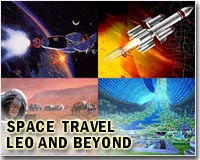 |
Houston TX (SPX) Dec 14, 2010 Boeing has submitted its proposal for the second round of NASA's Commercial Crew Development (CCDev) program. Boeing plans to advance the design of its Crew Space Transportation (CST)-100 spacecraft and Commercial Crew Transportation System and continue to demonstrate key technologies. "In the same way that Boeing helped launch commercial aviation more than 80 years ago, we are working to develop what could become a true commercial space transportation system: a commercial service to take people to the International Space Station and other Low Earth Orbit destinations," said Brewster Shaw, Boeing Space Exploration vice president and general manager. "We plan to further mature our design and continue the development process toward our first crewed flight in 2015." Boeing is proposing an approach that will significantly mature the CST-100 design through demonstrations of critical subsystems. The CST-100 spacecraft is designed to support NASA's primary objective of affordable access to Low Earth Orbit. It will carry up to seven crew and passengers, is reusable up to 10 times, and is compatible with a variety of expendable launch vehicles. The spacecraft - which is comprised of a Crew Module and a Service Module - draws on Apollo-proven aerodynamic characteristics in a design that uses commercial, off-the-shelf, cost-effective technologies. Boeing will build on its efforts performed under the first round of the CCDev program, which greatly reduced program risk. In October, Boeing completed a Systems Definition Review with NASA that defined the CST-100 spacecraft's system characteristics and configuration and established a baseline design. Other major accomplishments of the first round include: + Design, build and test of a pressurized structure of the crew module + Creation of a mock-up of the spacecraft to ensure the crew can enter and exit the vehicle safely, reach control switches and easily see through windows + Demonstration of manufacturability of the base heat shield structure and thermal protection system to protect the crew during re-entry into Earth's atmosphere + Development of an avionics systems integration facility to support rapid prototyping and full-scale development + Development of a rendezvous sensor and associated guidance and navigation software that allows the vehicle to autonomously approach and dock with the International Space Station and the planned Bigelow Orbital Space Complex + Demonstration of airbag land landing, water landing, post-water landing uprighting and life-support systems. "We look forward to continuing our joint efforts with NASA to ensure CCDev's success," said Shaw. "Enabling commercial-crew access to Low Earth Orbit allows NASA to focus on deep space exploration and thereby ensure a continued leadership role for the U.S. in human spaceflight for generations to come."
Share This Article With Planet Earth
Related Links NASA Commercial Crew Development (CCDev) program Space Tourism, Space Transport and Space Exploration News
 South Africa unveils space agency
South Africa unveils space agencyJohannesburg (AFP) Dec 9, 2010 South Africa unveiled its national space agency on Thursday, aiming to become a leader in earth observation technology across the continent in 10 years, the minister of science and technology said. "Our combined efforts at enhancing South Africa's space capabilities will be of immense value to the scientific community in the Southern African region," Naledi Pandor said. "We believe (the ... read more |
|
| The content herein, unless otherwise known to be public domain, are Copyright 1995-2010 - SpaceDaily. AFP and UPI Wire Stories are copyright Agence France-Presse and United Press International. ESA Portal Reports are copyright European Space Agency. All NASA sourced material is public domain. Additional copyrights may apply in whole or part to other bona fide parties. Advertising does not imply endorsement,agreement or approval of any opinions, statements or information provided by SpaceDaily on any Web page published or hosted by SpaceDaily. Privacy Statement |